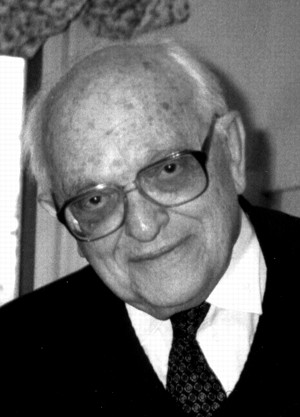
Anatoly Borisovich RAPOPORT (20.05.1911, Lozovaya — 20.1.2007 Toronto, Canada) — Russian and American mathematician and philosopher. He is a pioneer and leading figure of the systems sciences, studies in conflict and cooperation, and peace research.
Rapoport came to the U.S.A. in 1922, where he attended public schools. Later he studied music, first in Chicago and then in Vienna (1929-34), where he concluded his studies of composition, piano, and conducting at the State Academy of Music and Performing Arts. During his studies he was correspondent of the American journal Musical Courier. Subsequently he performed as a concert pianist and lectured on the semantics of music in Europe and the Americas. In 1941 Rapoport received a Ph.D. degree in mathematics at the University of Chicago. His first work dealt with a phenomenon analogous to what, in the context of human systems, would occupy him for most of his professional life: Conflict and cooperation. His research relates with Lorenz investigation of aggression at the same time.
Early on, his interest was very much a meta-theoretical, epistemological one. This led to his books Science and the Goals of Man (1950) and Operational Philosophy (1953), which address the question of whether human or social values can have a common basis, independently of modes of thought and feeling that originate from different cultures. Rapoport has spearheaded many scientific innovations, including the application of mathematical methods, first to biology and later to the social sciences. His philosophical position is related to positivism and pragmatism without being confined by these categories. In his search for invariants Rapoport has cultivated an extensive dialogue across disciplines. In 1954, he founded the Society for General Systems Research, later renamed International Society for the Systems Sciences. Essentially this society has aimed at overcoming the growing isolation of specialized disciplines.
From 1955 to 1970 Rapoport was Professor of Mathematical Biology and Senior Research Mathematician at the University of Michigan, Ann Arbor. That phase bred seminal contributions to game theory which were condensed in six books, including Fights, Games, and Debates (1960), probably his most widely read opus. Referencing to Rapoport, in 'Postmodern condition' J.-F. Lyotard argues that in the game with uncompleted information one looks for additional and probable resources, but to receive a result in the games with complete information one should re-construct the same data into another order. (La condition postmoderne, Paris: Minuit, 1979, p. 125). No doubt that this Rapoport's 'method' looks like what we know in postmodern philosophy as 'deconstruction', i.e. reorganization of discourse to discover a new meaning.
Since 1970, the University of Toronto has been Rapoport's academic base, where he has operated both as Professor of Psychology and Mathematics and Professor for Peace and Conflict Studies. He has gone on to deepen much of his earlier work in later studies, e.g. in (1) the application of mathematical methods to the humanities (Mathematical Methods in the Social and Behavioral Sciences, 1984;), (2) general semantics, treated from an evolutionist perspective (Semantics, 1975), (3) game theory (The 2 x 2 Game, with M. Geyer and D. Gordon, 1976), (4) systems theory (General System Theory, 1984), (5) decision theory (Decision Theory and Decision Behavior, 1989).
In his article 'Dream as a semiotic object' (1998) published in Lotman's collection of Tartu Semiotic School Rapoport applies his general semantics to the dreams interpretation. He looks to find the meaning of dream that he calls 'rationality', and which constitutes dream as an unconscious message. He develops his conception of semiotic structure of mentality in his further work What is rationality? (2002).
-=-
by Anatoly Rapoport:
Rapoport A. Science and the Goals of Man, 1950
Rapoport A. Operational Philosophy, 1953; (also in German)
Rapoport A. Fights, Games, and Debates, 1960
Rapoport A. Strategy and Conscience, 1964
Rapoport A. Prisoner's Dilemma (with A.M. Chammah), 1965
Rapoport A. Two-Person Game Theory, 1966
Rapoport A. N-Person Game Theory, 1970
Rapoport A. The Big Two, 1971
Rapoport A. Conflict in Man-made Environment, 1974
Rapoport A. Semantics, 1975; (also in German)
Rapoport A. Mathematical Methods in the Social and Behavioral Sciences, 1984; (also in German)
Rapoport A. General System Theory, 1986; (also in German)
Rapoport A. The Origins of Violence, 1989; (also in German)
Rapoport A. Decision Theory and Decision Behavior, 1989; 1998
Rapoport A. Peace, an Idea Whose Time Has Come, 1993; (also in German and Russian)
Rapoport A. Certainties and Doubts, 2000
Rapoport A. Skating on Thin Ice, 2001
Rapoport A. Conversations with Three Russians — Tolstoy, Dostoevsky, Lenin. A Systemic View on Two Centuries of Societal Evolution, 2005
Rapoport A., Geyer M., D. Gordon The 2 x 2 Game, 1976
Rapoport Anatol, Rapoport Anthony, Canada and the World, 1992
-=-
Maria Bocharova, M.Phil. (Moscow)
E-mail: autre-jouissance@mail.ru
Thanks to:
Markus Schwaninger, Ph.D., Prof.
University of St. Gallen (Switzerland)
E-mail: markus.schwaninger@unisg.ch
